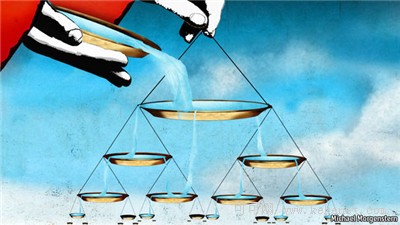- 阅读
- 阅读
- 技巧
- 百科
- 试题
- 文化
- 技能
Nothing new under heaven
天下之事,古已有之
What philosophers thought when China was the world and how it can help China now
昔日中国一统天下之时,哲学家们的所思所想,及其对今日中国的裨益
WHEN Henry Kissinger was paying his pioneering visits to China in the early 1970s, the country was in the grip of a campaign to criticise both Lin Biao, a recently dead and disgraced Communist leader, and Confucius. As was later remarked, it was as if the American press were vilifying Richard Nixon and Aristotle. But China’s own past—the 5,000 years of history of which its leaders often like to remind foreign interlocutors—is a constant presence in its domestic politics and its view of the world.
当亨利•基辛格在1970年代初开启访华的破冰之旅的时候,这个国家尚沉浸在批林批孔运动之中(林彪是一位蒙羞的共产党领导人,刚辞世不久)。就像后来评论所指出的那样,这种情况就好像美国报刊在诽谤尼克松和亚里士多德。但是中国自己的历史——其领导人在谈话中总是喜欢向外国人提及的5000年历史——在中国国内政治和中国对世界的看法中,一直发挥着恒久不衰的影响。
Yet China’s recent rise has taken place in a world organised along principles devised elsewhere, by foreign parvenus. Many Chinese chafe at the common Western notion that multiparty democracy is the form of government towards which all other systems evolve. But some scholars also resent another European invention: the nation-state, the basis of modern diplomacy. For years they have struggled to develop a distinctively Chinese theory of international relations. This is almost a matter of national pride, even chauvinism: “As a rapidly rising major power, it is unacceptable that China does not have its own theory,” wrote Qiu Yanping, a senior Communist Party man, in an article in 2009.
而近些年来中国崛起所处的大背景却是一个遵循外国新贵所创设的原则而建构起来的世界。西方人通常认为,多党民主是所有其他制度最终要逐渐发展到的政体,而许多中国人却对这种观念颇为恼怒。但一些学者也对欧洲另一项创造深表不安,那就是民族国家——现代外交的基石。多年以来,他们一直殚精竭虑地阐发中国特色的国际关系理论,毕竟这几乎事关民族自豪感,甚至民族沙文主义:“中国作为一个快速崛起的大国,绝不能没有自己的理论”,2009年时一个名叫邱延平(音译)的共产党高官在一篇文章中如是写道。

So attempts to apply precepts devised by ancient Chinese philosophers to the modern world are in vogue. One popular revival is the notion of tianxia, or “all under heaven”. This dates back to the golden age of classical Chinese philosophy—of Confucius, Mencius, Laozi and the rest—in the “warring states” period before China’s unification in 221BC under the first Qin emperor. Tianxia is widely understood as a unified world dominated by one country (call it the “middle kingdom”, perhaps), to which neighbours and those beyond look for guidance and pay tribute.
According to Zhao Tingyang, a Beijing-based philosopher known for his book of a few years ago on tianxia, the concept is based on the vision of an ancient sage-king, the Duke of Zhou. The duke realised that for Zhou, a small state, to exercise sway over other feuding states, he could not rely on force of arms. It had instead to draw on its own moral and political example. As Mr Zhao updates this, tianxia is a Utopian vision of universal harmony, unattainable, he concedes, for 200-300 years, where everybody opts into a system of global government.
北京的赵汀阳(音译)是一个哲学家,以其几年前所写的一部关于天下的书而闻名遐迩,他表示“天下”这个概念是以古代一位圣君——周公的愿景为基础的。周公认识到,对于周国这个小国来说,要想统治其他番邦,就不能诉诸武力,而必须转而求之于自己在道德和政治上的表率作用。“天下” 如果用赵翻译成的现代术语来说,就是一种普遍和谐的乌托邦式的愿景,他承认200-300年内是实现不了的, 因为现在人人都选择一种全球政府的体系。
Mr Zhao, a courteous, gentle and rather otherworldly scholar, is no tub-thumping Chinese nationalist. There is now no need, he says, as there was in the Duke of Zhou’s day, for one predominant state. He is not advocating a world order led by China, but a system of equality. Nor is there to be compulsion. Tianxia is a voluntary choice. It is also, self-evidently, a distant dream rather than a manifesto for practical politics.
赵是一位彬彬有礼、温文尔雅和颇为超凡脱俗的学者,而不是一个慷慨激昂的中国民族主义者。他说,就像周公时期一样,当今的国家也没有必要追求主导地位。他所主张的并不是一个中国所主导的世界秩序,而是一个平等的制度, “天下”是自愿的选择,没有强迫。对于权术政治来说,这只是一个遥远的梦想,而不是一个宣言,这当然是不言而喻的。
It has, however, made an impression. Some even see its influence in the ideal adopted by China’s Communist Party leader, Hu Jintao, whom Mr Zhao has never met, of a “harmonious society”. In popular culture, tianxia loomed large in “Hero”, an epic martial-arts film by Zhang Yimou, one of China’s best-known directors, set at the time of the Qin unification and released in 2002. Some also heard tianxia echoes in the slogan for the 2008 Beijing Olympics: “One world, one dream”.
然而“天下”这个概念也让人眼前一亮,一些人甚至在中共领导人胡锦涛(赵与他从未谋面)所倡导的“和谐社会”理想中,察觉到它的影子。在流行文化中,“天下”的概念在张艺谋(中国最著名的导演之一)史诗般的武侠片——《英雄》中赫然耸现。该片以秦统一中国时期为背景,曾经在2002年上映。一些人也在2008年北京奥运会的广告语——“同一个世界,同一个梦想”中听出了“天下”的回声。
Though Mr Zhao was not proposing an indigenous blueprint for a China-led new world order to supplant the one led by America, the misconception that he was explains some of his appeal within China. One of the most popular books on sale in China at the moment is on “The rise of a ‘civilisational state’”, by Zhang Weiwei. Mr Zhang argues that China is unique as “the world’s only amalgam of an ancient civilisation and a huge modern state”, and is “increasingly returning to its own roots for inspiration, and producing its own norms and standards.”
虽然赵并未就由中国取代美国领导世界新秩序问题提出中国自己的蓝图,但是人们却误解他有提出这个蓝图,这令他在国内颇受欢迎。张维为的新书《一个文明型国家的崛起》目前进入中国最畅销书榜单。张认为,中国作为“世界仅有的古代文明与庞大的现代国家的融合之物”是很不寻常的,它正越来越多地回到根基寻求灵感,创造它自己的准则和规范。”
In another new book (this one in English), “Ancient Chinese Thought, Modern Chinese Power”, Yan Xuetong, a scholar at Tsinghua University in Beijing, concludes that “it is not possible to create a Chinese school of international-relations theory.” But he does think pre-Qin thought can “develop and enrich international-relations theory”. A British commentator once dubbed Mr Yan a “neo-comm”, analogous to an American neocon—ie, an assertive Chinese nationalist intent on facing down American hegemony. But Daniel Bell, also of Tsinghua, one of the book’s editors, argues this misrepresents Mr Yan’s views by overlooking the emphasis he, like the pre-Qin philosophers, puts on the importance of morality in politics, and in establishing China as a “superpower modelled on humane authority”.
在另一本新书——《古代中国思想,现代中国力量》中(这一本是用英文写的),北京清华大学学者阎学通断言,“创立一个国际关系理论的中国学派是不可能的”,但他认为先秦思想能够“发展和丰富国际关系理论”。一名英国评论家曾经把阎称为一个“新共产主义者”,即一个决心挫败美国霸权主义的坚定的中国民族主义者——有点儿类似于美国的新保守主义者。但是该书的编者之一丹尼尔•贝尔(也来自清华)却主张,阎的观点由于人们忽视了他所强调的重点而受到了误解,他像先秦的哲学家一样,论述了在政治活动和使中国成为一个“以人治为本的超级大国”的过程中道德的重要性。
参与评论